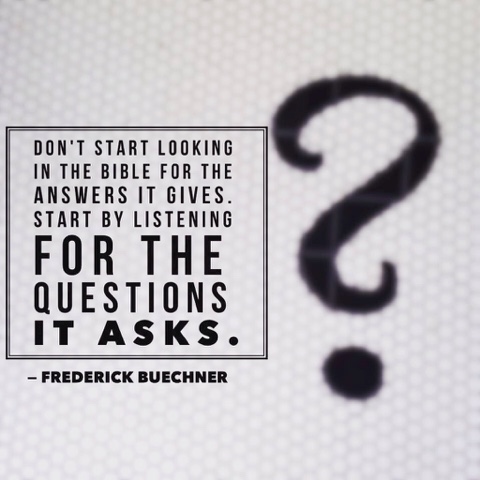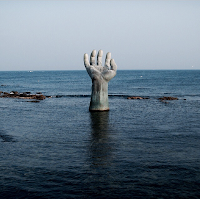Wednesday, July 29, 2015
Wednesday, July 22, 2015
Thursday, July 16, 2015
Wednesday, July 15, 2015
American Christians: Drop The Persecution Complex - Rachel Held Evans
Did you hear about the pastor who was arrested for not marrying a same-sex couple? What about the publisher that got sued for refusing to censor anti-gay verses from the Bible?
Both of these stories have been exposed as fakes of course, but that didn’t keep hundreds of thousands of conservative Christians from sharing them online this week.
When I pointed out to a friend that the story he had just shared on social media wasn’t true, he replied, “well it might as well be. Christians in this country are under attack.”
The persecution complex is not based in reality.
Not only do American Christians experience complete religious freedom in this country, we also enjoy tremendous privilege. More than seventy-percent of the population identifies as Christian, as do the majority of our representatives to congress and every single U.S. president. Our churches, whose steeples dot every cityscape and small town in the land, are exempt from paying taxes.
“[Christians] are manufacturing conflicts in order to have something to rally behind,” writes Neil Carter. “It makes them feel more in touch with the early Church’s tumultuous beginnings. But it takes a lot of smoke in mirrors."
The persecution complex minimizes the very real suffering of others.
The persecution complex blinds many American Christians to their own privilege, which then blinds them to the challenges faced by the genuinely underprivileged in this country.
In spite of shifting views on same-sex marriage, gay, lesbian, bisexual, and transgender people continue to face incredible hostility here in the U.S. and around the world, often at the hands of American Christians.
What the persecution complex suggests is that conservative Christians only care about bullying, oppression, and discrimination when they think it happens to them. If it happens to LGBT people, or to people in other religious minority groups, it is of little concern (or is tacitly supported). American Christians guard their privilege ruthlessly, even if it comes at the expense of others.
When American Christians obsess over their own perceived oppression, it becomes incredibly difficult to engage in important conversations about religious, racial, and gender privilege that are necessary for creating a more just society. How can we begin to recognize our own privilege and the harm it can cause when it remains unchecked if we believe ourselves to be an oppressed minority?
The persecution complex obscures the teachings of Jesus
You know who was actually persecuted for their religious beliefs? Jews under Roman occupation in the first century.
And you know what Jesus told those Jews to do? Pay your taxes. Give to those who ask. Do not turn people away. Love your neighbors. Love even your enemies.
And yet right now, some American Christians think that baking a cake for a gay couple is too much to ask. A spirit of fear and entitlement does more to obscure the gospel than elucidate it.
The full article is available here
Thursday, July 9, 2015
We All Need Relationship - Jeff Wiersma
"Out of selfness we grow towards selflessness."
We all know that we need relationship. As English author G.K. Chesterton wrote, “Two is not twice one. Two is a thousand times one.”
We all want to be known fully for who we really are, and yet that’s often just what we also fear more than anything else. We have our pride after all.
We believe the cultural myths that we can make our own way in the world, that we can fight our own battles.We often don’t want a helping hand because it threatens our false sense of self-reliance. And this is where many times we end up getting stuck.
But that’s not how we’re hardwired.
Like God, whose image we reflect (Genesis 1:26: “let US make mankind in OUR image”), we are social beings. We’re designed to give and receive love in community.
As author Frederick Buechner wrote, community is. "[h]ow we, by grace ... little by little ... become human; become whole, become truly loving. Out of selfness we grow towards selflessness."
Yes, having relationships with people can be scary and it can be thrilling, it can frustrating and it can be fulfilling, but it’s what we need.
We all know that we need relationship. As English author G.K. Chesterton wrote, “Two is not twice one. Two is a thousand times one.”
We all want to be known fully for who we really are, and yet that’s often just what we also fear more than anything else. We have our pride after all.
We believe the cultural myths that we can make our own way in the world, that we can fight our own battles.We often don’t want a helping hand because it threatens our false sense of self-reliance. And this is where many times we end up getting stuck.
But that’s not how we’re hardwired.
Like God, whose image we reflect (Genesis 1:26: “let US make mankind in OUR image”), we are social beings. We’re designed to give and receive love in community.
As author Frederick Buechner wrote, community is. "[h]ow we, by grace ... little by little ... become human; become whole, become truly loving. Out of selfness we grow towards selflessness."
Yes, having relationships with people can be scary and it can be thrilling, it can frustrating and it can be fulfilling, but it’s what we need.
Monday, July 6, 2015
Reflection and Renewal: May We Weep As You Weep and Love As You Love (based Isaiah 1:17)
God,
We are often preoccupied with ourselves, with what we want, and with what will make us feel comfortable. With our focus zoomed in ourselves, those who are suffering and need help are often totally off of our radar.
Remind us again of the things that you require of us; to learn to do good; to seek justice, to rescue the oppressed, to defend the orphan and to plead for the widow.
Forgive our short-sighted vision. Enable us to see this life as a gift from you to be shared. Fill our hearts with your love for all who suffer oppression, injustice, neglect and poverty, even if it means moving us beyond our comfort zones.
May we weep as you weep and love as you love. Deepen our connection with you and all that surrounds us.
Amen
We are often preoccupied with ourselves, with what we want, and with what will make us feel comfortable. With our focus zoomed in ourselves, those who are suffering and need help are often totally off of our radar.
Remind us again of the things that you require of us; to learn to do good; to seek justice, to rescue the oppressed, to defend the orphan and to plead for the widow.
Forgive our short-sighted vision. Enable us to see this life as a gift from you to be shared. Fill our hearts with your love for all who suffer oppression, injustice, neglect and poverty, even if it means moving us beyond our comfort zones.
May we weep as you weep and love as you love. Deepen our connection with you and all that surrounds us.
Amen
Saturday, July 4, 2015
Call to Worship: We Have Come Seeking (based on Psalm 34:8)
God of peace, we have come seeking. Your life-giving spirit is nourishment for our souls. We have come in search of meaning, connection, and togetherness. Help us to be open and to lean into your presence, which is always moving within and around us.
You are good. Your care and compassion know no end. For this amazing gift, we have come to give thanks together.
You are good. Your care and compassion know no end. For this amazing gift, we have come to give thanks together.
Friday, July 3, 2015
When Patriotism Becomes Idolatry - Zach Hunt in Relevant Magazine
There is NO space for the flag next to the bread and the cup on the altar of salvation. They are two radically opposed visions for the world.
Christians were a people who, under the threat of death, boldly professed allegiance to a kingdom that called Jesus, not Caesar is Lord.
And yet here we are some 2,000 years later. We’ve brought the brass eagle home to dwell among us.
How far have we fallen as a Church, how lost are we in patriotic idolatry that we’re worried about offending people if we remove a symbol from our sacred space that demands our allegiance to something other than the God we’ve come there to worship?
What makes patriotism an idol in the Church, and not just bad theology or bad story telling, is that the political ideology it brings with it can push out the need for Jesus and leave no space for the Gospel.
When “Americanized Christianity” takes over and the Gospel gets refined in the fires of patriotism, the story of the empire ultimately wins out and becomes a new story of faith.
We may continue to profess allegiance to Jesus, but our lives tell a much different story, one in which the Gospel has become supplanted by American political ideology such that theology seems strangely like a political agenda. When this happens, debates begin to rage about caring for the poor, the sick and the immigrant, debates which would be incomprehensible in any other era of the Church.
When patriotism becomes an idol, the poor can become our enemies, the alien among us can become someone to be feared and the outcast can become someone we actively seek to marginalize. When patriotism becomes an idol, the “other” whom we despise is the least of these.
Because of the truly radical nature of the Gospel, there is no space for the flag next the bread and the cup on the altar of salvation. They are two radically opposed visions for the world.
We have to choose which story we are going to be a part of.
The full article is available here
Christians were a people who, under the threat of death, boldly professed allegiance to a kingdom that called Jesus, not Caesar is Lord.
And yet here we are some 2,000 years later. We’ve brought the brass eagle home to dwell among us.
How far have we fallen as a Church, how lost are we in patriotic idolatry that we’re worried about offending people if we remove a symbol from our sacred space that demands our allegiance to something other than the God we’ve come there to worship?
What makes patriotism an idol in the Church, and not just bad theology or bad story telling, is that the political ideology it brings with it can push out the need for Jesus and leave no space for the Gospel.
When “Americanized Christianity” takes over and the Gospel gets refined in the fires of patriotism, the story of the empire ultimately wins out and becomes a new story of faith.
We may continue to profess allegiance to Jesus, but our lives tell a much different story, one in which the Gospel has become supplanted by American political ideology such that theology seems strangely like a political agenda. When this happens, debates begin to rage about caring for the poor, the sick and the immigrant, debates which would be incomprehensible in any other era of the Church.
When patriotism becomes an idol, the poor can become our enemies, the alien among us can become someone to be feared and the outcast can become someone we actively seek to marginalize. When patriotism becomes an idol, the “other” whom we despise is the least of these.
Because of the truly radical nature of the Gospel, there is no space for the flag next the bread and the cup on the altar of salvation. They are two radically opposed visions for the world.
We have to choose which story we are going to be a part of.
The full article is available here
Wednesday, July 1, 2015
Reflection and Renewal: Having Faith That Love Wins (based on James 1:22)
God,
It can easy for us to say we have faith or that we believe that you are love, but it can often be much more difficult for us to actually live that out in everyday life.
Sometimes it's difficult to have faith that you are love when we see the brokenness within and around ourselves. It is easy for us to forget that this brokenness is not the last truth about the world, but only the next to last truth.
Other times we reflexively say "God's in control" or "just have faith," perhaps brokenness in others reminds us of our brokenness and difficulties. This can lead us to avoid confronting the harsh realities of suffering or to distance ourselves from responsibility for the lostness and madness of the world; to try to hide behind a mask of certainty.
But faith isn't either of those things, so we come asking for forgiveness.
Help us to have true faith; to believe that in the end your love wins ... while also realistically acknowledging the existence of suffering, as well as being willing to travel alongside of all who are hurting, struggling, abused, oppressed, or neglected.
Faith is supposed to be the eye of our hearts, but we often struggle to see that way. Help us to do more than merely paying lip service to the truth that you are love. Help that truth to positively affect our thinking, actions, and decisions.
Amen
It can easy for us to say we have faith or that we believe that you are love, but it can often be much more difficult for us to actually live that out in everyday life.
Sometimes it's difficult to have faith that you are love when we see the brokenness within and around ourselves. It is easy for us to forget that this brokenness is not the last truth about the world, but only the next to last truth.
Other times we reflexively say "God's in control" or "just have faith," perhaps brokenness in others reminds us of our brokenness and difficulties. This can lead us to avoid confronting the harsh realities of suffering or to distance ourselves from responsibility for the lostness and madness of the world; to try to hide behind a mask of certainty.
But faith isn't either of those things, so we come asking for forgiveness.
Help us to have true faith; to believe that in the end your love wins ... while also realistically acknowledging the existence of suffering, as well as being willing to travel alongside of all who are hurting, struggling, abused, oppressed, or neglected.
Faith is supposed to be the eye of our hearts, but we often struggle to see that way. Help us to do more than merely paying lip service to the truth that you are love. Help that truth to positively affect our thinking, actions, and decisions.
Amen
Subscribe to:
Comments (Atom)











